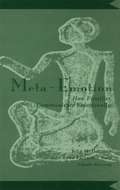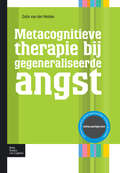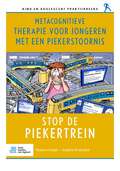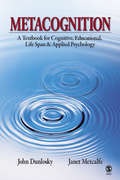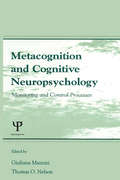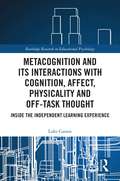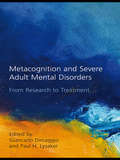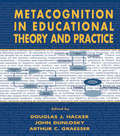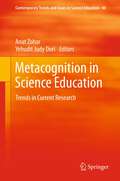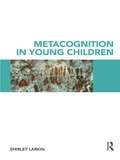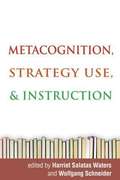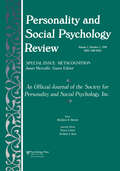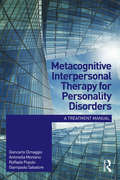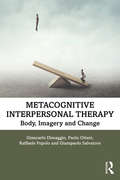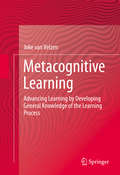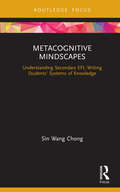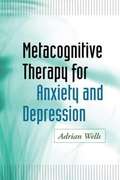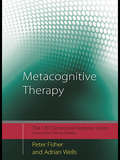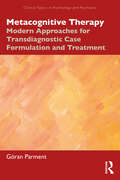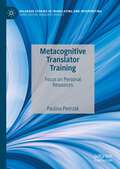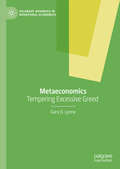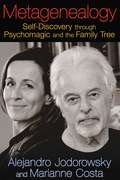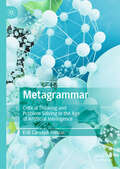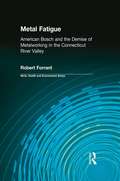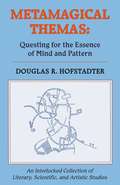- Table View
- List View
Meta-Emotion: How Families Communicate Emotionally
by John Mordechai Gottman Lynn Fainsilber Katz Carole HoovenThis book describes research on the emotional communication between parents and children and its effect on the children's emotional development. Inspired by the work, and dedicated to the memory of Dr. Haim Ginott, it presents the results of initial exploratory work with meta-emotion--feelings about feelings. The initial study of meta-emotion generated some theory and made it possible to propose a research agenda. Clearly replication is necessary, and experiments are needed to test the path analytic models which have been developed from the authors' correlational data. The authors hope that other researchers will find these ideas interesting and stimulating, and will inspire investigation in this exciting new area of a family's emotional life.
Metacognitieve therapie bij gegeneraliseerde angst (Protocollen voor de GGZ)
by Colin van der HeidenMetacognitieve therapie bij gegeneraliseerde angst is een protocol voor hulpverleners in de geestelijke gezondheidszorg, die patiënten met een gegeneraliseerde angststoornis (GAS) behandelen.Het protocol is gebaseerd op de metacognitieve therapie (MCT). MCT richt zich op de manier waarop mensen over hun gepieker nadenken. Dit in tegenstelling tot standaard cognitieve gedragstherapieprogramma's voor patiënten met een GAS, die zich richten op het onderzoeken van de inhoud van het piekeren. MCT is een veelbelovende behandeling voor patiënten met een GAS.Metacognitieve therapie bij gegeneraliseerde angst is bedoeld voor psychologen, psychotherapeuten, psychiaters en andere hulpverleners in de geestelijke gezondheidszorg, die patiënten met een gegeneraliseerde angststoornis (GAS) behandelen.Bij het boek is ook een werkboek verkrijgbaar. Het werkboek 'Stop met piekeren' (isbn97890313)wordt gebruikt naast een behandeling metacognitieve gedragstherapie. Het bevat informatie, formulieren en uitleg die de cliënt tijdens de behandeling nodig heeft.Bij het boek is ook een werkboek verkrijgbaar. Het werkboek 'Stop met piekeren' (isbn97890313)wordt gebruikt naast een behandeling metacognitieve gedragstherapie. Het bevat informatie, formulieren en uitleg die de cliënt tijdens de behandeling nodig heeft.Metacognitieve therapie bij gegeneraliseerde angst is onderdeel van de reeks Protocollen voor de GGZ. Elk deel geeft een sessiegewijze omschrijving van de behandeling van een specifieke psychische aandoening weer en bevat een dvd met beelden van therapiesessies. De theorie is beknopt en berust op wetenschappelijke evidentie. Protocollen voor de GGZ is bedoeld voor psychologen, psychotherapeuten, psychiaters en andere hulpverleners.
Metacognitieve therapie voor jongeren met een piekerstoornis: Stop de piekertrein (Kind en adolescent praktijkreeks)
by Tamara Luijer Sophie FranckenIn dit boek wordt uitgelegd op welke manier metacognitieve therapie (MCT) kan worden toegepast bij jongeren (12-18 jaar) waarbij een gegeneraliseerde angststoornis (GAS) is vastgesteld. Diverse recente onderzoeken tonen aan dat MCT effectiever lijkt te zijn dan cognitieve gedragstherapie (CGT) wanneer sprake is van een GAS, zowel bij volwassenen als bij kinderen/jongeren. Binnen MCT ligt de focus van de behandeling op het piekerproces in plaats van op de inhoud van de gedachten. Zowel binnen de MCT als in deze therapeutenhandleiding wordt veel gebruik gemaakt van metaforen en verschillende actieve werkvormen, waaronder gedragsexperimenten. Daarnaast is er binnen de (twee) oudersessies aandacht voor de rol van de opvoeder(s). Het doel van de behandeling is dat de jongere meer grip krijgt op zijn/haar eigen denkproces, waardoor de piekerproblemen afnemen en deze de ontwikkeling niet (verder) verstoren. Jongeren werken tijdens de behandeling met het bijbehorende werkboek Stop de piekertrein. Metacognitieve therapie voor jongeren met een piekerstoornis is geschreven door Tamara Luijer en Sophie Francken. Tamara Luijer is orthopedagoog-generalist, cognitief gedragstherapeut (i.o.) en metacognitief therapeut (i.o.). Sophie is psycholoog en cognitief gedragstherapeut (i.o.). Tamara en Sophie werken samen in de kinder- en jeugdpsychiatrie waar ze veel jongeren met internaliserende problematiek behandelen.
Metacognition
by Dr John Dunlosky Janet MetcalfeMetacognition is the first textbook to focus on people's extraordinary ability to evaluate and control their cognitive processes. This comprehensive text covers both theoretical and empirical metacognitive research in educational, developmental, cognitive and applied psychology.Authors John Dunlosky and Janet Metcalfe address many of the key questions that have inspired scientists to pursue research in this domain. To answer these and many other questions, the authors assess major theoretical themes and programmatic research in the field. The authors also include chapters that define the scope of metacognition and cover its historical origins. Not only do they describe well-received theories about the nature of metacognition, but they also highlight unresolved mysteries currently on the cutting-edge of research. Key Features Emphasizes the practical relevance of theory and research in metacognition to learning with the use of "Application" boxes Introduces students to important questions that have yet to be answered by the metacognitive research literature with the inclusion of "Mystery" boxesProvides three easy-to-conduct demonstrations (e.g., tip-of-the-tongue experience, delayed-judgment-of-learning effect, etc.) that students can try themselves Offers brief biographies that introduce students to some of the most influential leaders in metacognitionIncludes a general summary at the end of each chapteIntended AudienceThis text is an ideal resource for undergraduate cognitive psychology students. It also serves as comprehensive handbook for more advanced students and psychological scientists engaged in the study of metacognitive processes.
Metacognition and Cognitive Neuropsychology: Monitoring and Control Processes
by Giuliana Mazzoni Thomas O. NelsonControl processes are those mental functions that allow us to initiate, monitor, and prioritize mental activities. They are crucial to normal mental functioning. A better understanding of the nature of control processes and their deficits is important for clinical work and for an adequate theory of consciousness. Previously, control processes have been examined within the frameworks of two parallel but independent paradigms: those of cognitive psychology and of neuropsychology. Cognitive psychologists have stressed the theoretical and empirical nature of normal unimpaired control processes; neuropsychologists have focused on the relationships between damage to specific functional areas of the brain and deficits in specific control processes. Both have contributed extensively to our understanding of control processes. However, they have tended to operate independently, with little if any cross-talk between disciplines, despite the potential benefits such dialogue is likely to generate. This book represents the first attempt to synthesize cognitive and neuropsychological perspectives on control processes. It contains state-of-the-art reports on various aspects of control processes by experts from both disciplines.
Metacognition and Its Interactions with Cognition, Affect, Physicality and Off-Task Thought: Inside the Independent Learning Experience (Routledge Research in Educational Psychology)
by Luke CarsonWhat happens when teachers are removed from the equation, when we learn by ourselves or with peers? Increasingly rapid change is part of our world today and tomorrow. The need to learn and to adapt is now lifelong and ubiquitous. But are educators and educational institutions preparing today’s students for this reality? Educators and institutions choose pedagogic models, design curricula and provide instruction. However, this does not mirror the learning environments that we inhabit outside of formal education, nor does it reflect all our learning time during formal education. This text provides a data-driven picture of the independent learning experience – what occurs in the minds of learners as they negotiate learning tasks without (or with less) guidance and instruction. Cognition, distraction, embodied experience, emotion, and metacognition are central to this learning. Drawing on new empirical data, this volume focuses on university-aged learners. These are the learners who have been through our formal educational systems. Do they learn well in independent settings? Have they been prepared for this? Through an explication of this experience, this volume makes a case for how we can better prepare them for the demands of current and future learning.
Metacognition and Severe Adult Mental Disorders: From Research to Treatment
by Giancarlo DimaggioMany adults who experience severe mental illness also suffer from deficits in metacognition - put simply, thinking about one’s own thought processes - limiting their abilities to recognize, express and manage naturally occurring painful emotions and routine social problems as well as to fathom the intentions of others. This book presents an overview of the field, showing how current research can inform clinical practice. An international range of expert contributors provide chapters which look at the role of metacognitive deficit in personality disorders, schizophrenia, and mood disorders, and the implications for future psychotherapeutic treatment. Divided into three parts, areas covered include: how metacognitive deficits may arise and the different forms they might take the psychopathology of metacognition in different forms of mental illness whether specific deficits in metacognition might help us understand the difficulties seen in differing forms of severe mental illness. Offering varying perspectives and including a wealth of clinical material, this book will be of great interest to all mental health professionals, researchers and practitioners.
Metacognition in Educational Theory and Practice (Educational Psychology Series)
by Arthur C. Graesser John Dunlosky Douglas J. HackerThis volume presents the most current perspectives on the role of metacognition in diverse educationally relevant domains. The purpose is to examine the ways in which theoretical investigations of metacognition have recently produced a strong focus on educational practice. The book is organized around four general themes relevant to education: metacognition and problem solving, metacognition and verbal comprehension, metacognition and the education of nontraditional populations, and metacognition and studentship. Chapter authors review current literature as it applies to their chapter topic; discuss theoretical implications and suggestions for future research; and provide educational applications. Each chapter describes testable theory and provides examples of how theory can be applied to the classroom. The volume will have wide appeal to researchers and students concerned with the scientific investigation of metacognition, and to practitioners concerned with the cultivation of learning and achievement in their students. The unique contribution of this book to the literature on metacognition is its presentation of the most current research examining specific theoretical aspects of metacognition in domains directly relevant to education. This is especially valuable for the many researchers and practitioners who subscribe to the concept that by fostering metacognitive processes during instruction, more durable and transferable learning can be achieved.
Metacognition in Science Education
by Anat Zohar Yehudit Judy DoriWhy is metacognition gaining recognition, both in education generally and in science learning in particular? What does metacognition contribute to the theory and practice of science learning? Metacognition in Science Education discusses emerging topics at the intersection of metacognition with the teaching and learning of science concepts, and with higher order thinking more generally. The book provides readers with a background on metacognition and analyses the latest developments in the field. It also gives an account of best-practice methodology. Expanding on the theoretical underpinnings of metacognition, and written by world leaders in metacognitive research, the chapters present cutting-edge studies on how various forms of metacognitive instruction enhance understanding and thinking in science classrooms. The editors strive for conceptual coherency in the various definitions of metacognition that appear in the book, and show that the study of metacognition is not an end in itself. Rather, it is integral to other important constructs, such as self-regulation, literacy, the teaching of thinking strategies, motivation, meta-strategies, conceptual understanding, reflection, and critical thinking. The book testifies to a growing recognition of the potential value of metacognition to science learning. It will motivate science educators in different educational contexts to incorporate this topic into their ongoing research and practice.
Metacognition in Young Children
by Shirley LarkinMetacognition is known to be an important factor in academic achievement; however it is also important in a wider life context. The ability to reflect upon how we are thinking can help us to make wiser decisions in all aspects of our life. This book addresses how metacognition might be fostered in young children. Examining theories of particular relevance to primary school age children the author combines her empirical work over the last 8 years with the work of other researchers to show that children of all ages display metacognitive processing, given the right kind of environment. Drawing on evidence from psychology and education, Metacognition in Young Children brings together international research from different curriculum areas. As well as the traditional areas of science, mathematics and literacy, the author considers metacognition in physical education, art, drama and music. The book argues for a development of metacognition theory, which takes account of wider contextual and political factors. This book includes: Real classroom examples, taking account of the whole child, socio-cultural context and the curriculum Practical examples of developing metacognition across the curriculum Advice on building metacognitive environments in the classroom Development of metacognition theory Essential reading for educational psychology and research students, this book will appeal to trainee and practising teachers with an interest in facilitating young children’s development into wise and thoughtful adults. It offers practical advice supported by theory and evidence.
Metacognition, Strategy Use, and Instruction
by Harriet Waters Wolfgang SchneiderShowcasing exemplary research programs, this book explores how the latest theories and findings on cognitive development can be used to improve classroom instruction. The focus is on how children acquire knowledge about the processes involved in learning such as remembering, thinking, and problem solving as well as strategies for mastering new information. The contributors are leading experts who illustrate ways teachers can support the development of metacognition and goal-directed strategy use throughout the school years and in different academic domains. Teacher behaviors and instructional methods that promote these abilities are identified, and innovative assessment approaches and research designs are described.
Metacognition: A Special Issue of personality and Social Psychology Review
by Nancy Cantor Marilynn B. Brewer Janet Metcalfe Norbert L. KerrThis special issue on the psychology of knowing about knowing bridges the parallels between social and cognitive psychology. It further illustrates the benefits of pursuing in depth these connections and the phenomena and implications associated with them.
Metacognitive Interpersonal Therapy for Personality Disorders: A treatment manual
by Giancarlo Dimaggio Antonella Montano Raffaele Popolo Giampaolo SalvatorePatients with personality disorders need targeted treatments which are able to deal with the specific aspects of the core pathology and to tackle the challenges they present to the treatment clinicians. Such patients, however, are often difficult to engage, are prone to ruptures in the therapeutic alliance, and have difficulty adhering to a manualized treatment. Giancarlo Dimaggio, Antonella Montano, Raffaele Popolo and Giampaolo Salvatore aim to change this, and have developed a practical and systematic manual for the clinician, using Metacognitive Interpersonal Therapy (MIT), and including detailed procedures for dealing with a range of personality disorders. The book is divided into two parts, Pathology, and Treatment, and provides precise instructions on how to move from the basic steps of forming an alliance, drafting a therapy contract and promoting self-reflections, to the more advanced steps of promoting change and helping the patient move toward health and adaptation. With clinical examples, summaries of therapies, and excerpts of session transcripts, Metacognitive Interpersonal Therapy for Personality Disorders will be welcomed by psychotherapists, clinical psychologists and other mental health professionals involved in the treatment of personality disorders.
Metacognitive Interpersonal Therapy: Body, Imagery and Change
by Giancarlo Dimaggio Raffaele Popolo Giampaolo Salvatore Paolo OttaviMetacognitive Interpersonal Therapy (MIT) remains unique in providing instruments for dealing with clients with prominent emotional inhibition and suppression, a population for whom treatment options are largely lacking. This book provides clinicians with techniques to treat this population, including guided imagery and re-scripting, two-chairs, role-play, body-oriented work and interpersonal mindfulness. Metacognitive Interpersonal Therapy is aimed at increasing clients’ awareness of their inner world, fostering a sense of agency over their experience, and dismantling the core, embodied aspects of the schemas. The techniques included also provide clients with fresh instruments to overcome pain and act creatively in their everyday life. Using an improved version of the MIT decision-making procedure, the authors have provided a set of techniques aimed at modifying mental imagery, body states, and behaviour, as well as at steering attention to avoid falling prey to rumination. The book is structured to gently push clients towards change, but also to always prioritize the clients’ goals and needs. Metacognitive Interpersonal Therapy serves as an important guide for clinicians of any orientation.
Metacognitive Learning
by Joke Van VelzenIn this book, the educational theory of metacognitive learning and its instructional implications are used to describe and illustrate how learners can become effective or self-directive learners. First, three levels of general knowledge of the learning process are discussed in this book through an overview of research studies. The book then describes how learners can develop along these levels and learn to effectively plan their learning. This book includes study and educational material centered on the learning and instruction of general knowledge of the learning process.
Metacognitive Mindscapes: Understanding Secondary EFL Writing Students' Systems of Knowledge
by Sin Wang ChongSynthesizing research on metacognition and intersecting it with studies on second and foreign language writing, Sin Wang Chong puts forward a conceptual framework of metacognition and metacognitive knowledge that is employed as an analytical lens to examine junior secondary EFL students’ writing proficiencies. The exploration takes into account three facets of metacognitive knowledge, namely person knowledge, task knowledge, and strategic knowledge. Based on data garnered from interviews, open-ended questionnaires, and think-aloud sessions with students, the book analyzes the three types of metacognitive knowledge – theorized as a system – of junior secondary students with high, average, and low writing proficiencies. Discussion of the findings offers an expanded understanding of the factors that potentially affect students’ writing proficiencies, which will inform the teaching of primary and secondary EFL writing teachers to be more learner-centered. The book will appeal to researchers and teachers interested in metacognition and metacognitive knowledge.
Metacognitive Therapy for Anxiety and Depression
by Steven Hollon Adrian WellsThis groundbreaking book explains the "whats" and "how-tos" of metacognitive therapy (MCT), an innovative form of cognitive-behavioral therapy with a growing empirical evidence base. MCT developer Adrian Wells shows that much psychological distress results from how a person responds to negative thoughts and beliefs-for example, by ruminating or worrying-rather than the content of those thoughts. He presents practical techniques and specific protocols for addressing metacognitive processes to effectively treat generalized anxiety disorder, obsessive-compulsive disorder, posttraumatic stress disorder, and major depression. Special features include reproducible treatment plans and assessment and case formulation tools, plus a wealth of illustrative case material.
Metacognitive Therapy: Distinctive Features (CBT Distinctive Features #1)
by Adrian Wells Peter FisherMetacognitive therapy is based on the principle that worry and rumination are universal processes leading to emotional disorder. These processes are linked to erroneous beliefs about thinking and unhelpful self-regulation strategies. Metacognitive Therapy: Distinctive Features is an introduction to the theoretical foundations and therapeutic principles of metacognitive therapy. Divided into two sections, Theory and Practice and using thirty key points, the authors explore how metacognitive therapy can allow people to escape from repetitive thinking patterns that often lead to prolonged psychological distress. This book is a valuable resource for both students and practitioners wishing to develop a basic understanding of metacognitive therapy and how it compares and contrasts with traditional forms of cognitive behavioural therapy.
Metacognitive Therapy: Modern Approaches for Transdiagnostic Case Formulation and Treatment (Clinical Topics in Psychology and Psychiatry)
by Göran ParmentMetacognitive Therapy is an indispensable guide both for experienced and newly trained therapists who sometimes feel stuck or who are looking for a clear roadmap for conceptualizing and treating complex and comorbid problems.Drawing on the transdiagnostic approach pioneered by Wells in 2009, Göran Parment uses his extensive clinical experience to guide the reader through the core concepts in MCT, illustrating the theoretical model with clinical examples and references to the latest evidence-based research. The book points out the significant transdiagnostic possibilities across disorders and shows how MCT can be applied to a wide array of common clinical disorders and comorbidities. The case formulation and the therapeutic procedures and applications are illustrated with clinical vignettes and therapist-client dialogues.The book also discusses common doubts and questions about MCT's application as well as MCT's potential as a paradigm-shifting form of psychotherapy.
Metacognitive Translator Training: Focus on Personal Resources (Palgrave Studies in Translating and Interpreting)
by Paulina PietrzakThis book explores new developments and objectives in translator education, with a focus on metacognitive aspects of both translating and learning to become a translator. The author reports on an exploratory study on translation graduates with particular attention to the effects of metacognitive awareness on their professional development. The data collected show that, despite the growing demand on translation services and advancement of translation technology, there are still a great number of translation graduates who decide not to become professional translators. The findings show a number of reasons why they choose different career paths and discuss the correlations between their self-concept and their professional development, as reflected in their academic performance, career choice, career paths, job satisfaction and perceived success. The book will appeal to teachers, trainers and academics in the field of translation studies, and more specifically translation as a profession and translator competence.
Metaeconomics: Tempering Excessive Greed (Palgrave Advances in Behavioral Economics)
by Gary D. LynneThis book presents the Metaeconomics Framework and Dual Interest Theory, which weave the empathy-based moral and ethical dimension back into key economic questions. Metaeconomics addresses the problem of placing too much emphasis on the market or the government, and thus argues that seeing the link between ego and empathy, self- and other-interest, and market and government will lead to a more just, fair, and sustainable polity. The unique Dual Interest Theory proposes that ego-based self-interest and empathy-based other-interest are joint and internal to each person: it maintains the original proposition from Adam Smith that each person maximizes their own-interest, which Metaeconomics makes clear involves balancing the two joint interests, although self-interest is more primal. The book begins with an explanation of how Metaeconomics connects the other kinds of economics. The book then provides a series of applications of Metaeconomics in heated policy issues, such as elections, finance, family, food, health, natural resources, education, taxes, and extreme inequality, among others. Finally, the book concludes that the only way to save capitalism is to bring empathy into both private and public actions and bring about a more humane balance in market and government.
Metagenealogy: Self-Discovery through Psychomagic and the Family Tree
by Alejandro Jodorowsky Marianne CostaA practical guide to recognizing and overcoming the patterns and influences of the four generations before you • Provides exercises to uncover your family’s psychological heritage, heal negative patterns of behavior and illness in your family tree, and discover your true self • Explains how we are the product of two forces: repetition of familial patterns from the past and creation of new ideas from the Universal Consciousness of the future • Interwoven with examples from Jodorowsky’s own life and his work with the tarot, psychoanalysis, and psychomagic The family tree is not merely vital statistics about your ancestors. It is an embodied sense of self that we inherit from at least four prior generations, constituting both a life-giving treasure and a deadly trap. Each of us is both an heir of our lineage and a necessary variation that brings the family into new territory. Are you doomed to repeat the patterns of your parents and grandparents? Or can you harness your familial and individual talents to create your own destiny? In Metagenealogy, Alejandro Jodorowsky and Marianne Costa show how every individual is the product of two forces: the imitating force, directed by the family group acting from the past, and the creative force, driven by the Universal Consciousness from the future. Interweaving examples from Jodorowsky’s own life and his work with the tarot, psychoanalysis, and psychomagic, the authors provide exercises, visualizations, and meditations to discover your family’s psychological heritage and open yourself to the growth and creativity of Universal Consciousness. They reveal how identifying the patterns, emotional programming, and successes and failures of the four generations that influence you--your siblings, parents, aunts, uncles, grandparents, and great-grandparents--allows you to see beyond the stable identity formed by family lineage. It frees you to overcome your inherited subconscious patterns of behavior and illness, stop the transmission of these patterns to future generations, and reconnect with your true self and unique creative purpose in life. By understanding your family tree and your place in it, you open your ability to heal the ancient struggle between the repetitive forces of the past and the creative forces of the future.
Metagrammar: Critical Thinking and Problem Solving in the Age of Artificial Intelligence
by Erik Camayd-FreixasThis book highlights the grammatical structure of thought and behavior as a blueprint for scientific discovery and innovation. It defines the new concept of metagrammar as the unnoticed transfer of linguistic functions and skills to and from our interaction with the world. Viewing grammar as language engineering, the author argues that metagrammar charts a new mode of reasoning central to critical thinking, problem solving and goal setting in all areas of human endeavor. He shows how metagrammatical structures and genres mediate in the conceptualization of phenomena, as well as in the production of plans, policies, systems and designs. This uniquely human capability is contrasted with mechanistic models in computers and AI that threaten to replace human agency and decision making. This book will be of interest to the educated reader who wants to keep abreast of transformational research in language and cognition as it applies to self and society, current events, digital media and emerging technologies, from artificial intelligence to autonomous systems, from a human-centered perspective. It will be particularly relevant to organizations such as the Modern Languages Association, for its focus on linguistic and narrative theory, cultural studies and critical theory.
Metal Fatigue: American Bosch and the Demise of Metalworking in the Connecticut River Valley (Work, Health and Environment Series)
by Robert Forrant Charles Levenstein John WoodingOn February 4, 1986, the lives of thousands of workers changed in ways they could only begin to imagine. On that day, United Technologies Corporation ordered the closure of the 76-year-old American Bosch manufacturing plant in Springfield, Massachusetts, capping a nearly 32-year history of job loss and work relocation from the sprawling factory. The author, a former Bosch worker and the business agent for the union representing nearly 1,200 Bosch employees when the plant closed, interjects his personal recollections into the story.For more than 150 years Springfield stood at the center of a prosperous 200-mile industrial corridor along the Connecticut River, between Bridgeport, Connecticut, and Springfield, Vermont, populated with hundreds of machine tool and metalworking plants and thousands of workers. This book is a historical account of the profound economic collapse of the Connecticut River Valley region, with a particular focus on Bosch, its workers, and its union. The shutdown is placed in the context of the wider region's deindustrialization. The closure marked the watershed for large-firm metalworking and metalworking unions in the Connecticut River Valley. The book also describes how the United States, in a ten-year period from the mid-1970s to the mid-1980s, went from being the world's leading exporter of machine tools to its leading importer, and how that sharp decline affected the region's leading city, Springfield, Massachusetts, which by 2005 was in danger of bankruptcy.
Metamagical Themas: Questing For The Essence Of Mind And Pattern
by Douglas HofstadterHofstadter's collection of quirky essays is unified by its primary concern: to examine the way people perceive and think.
